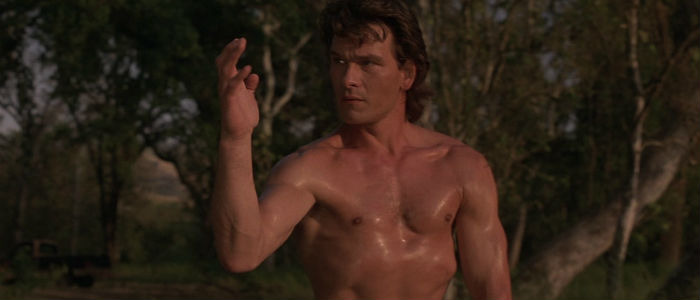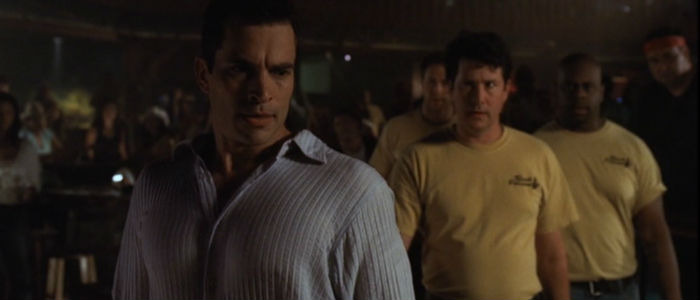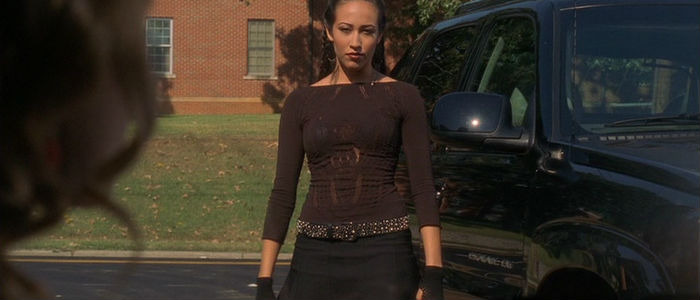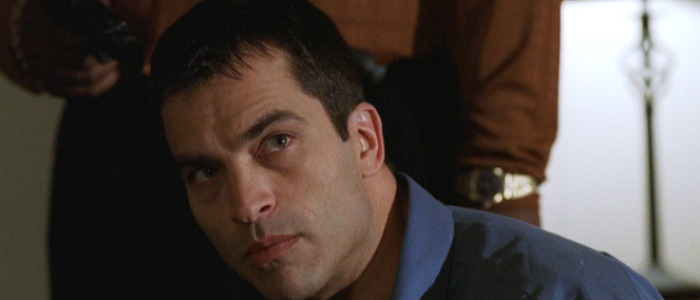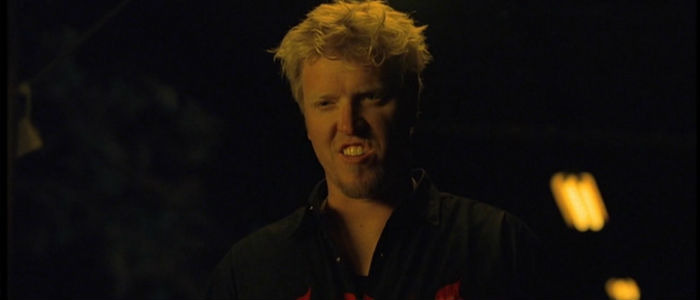Surprise! 'Road House 2: Last Call' Lacks The Original's Spirit
(Welcome to DTV Descent, a series that explores the weird and wild world of direct-to-video sequels to theatrically released movies. In this edition, we stop in for a drink and a bar fight with the sequel to a Patrick Swayze classic.)
If you're like me, when someone mentions Patrick Swayze the odds are you think immediately of a single movie – Donnie Darko (2001). But while that's guaranteed to be the first title to hit your brain there are numerous others waiting in the wings including The Outsiders (1983), Red Dawn (1984), Dirty Dancing (1987), Ghost (1990), Point Break (1991), and To Wong Foo Thanks for Everything, Julie Newmar (1995) just to name a few. He was never less than an engaging performer, and while he passed away in 2009 he lives on through these titles and more. That's the good news.
Three of his films were followed up by unexceptional sequels, and we're here to talk about the best of the bunch. (Please don't get your hopes up by my use of the word "best" as it's a relative term.) 1989's Road House is a cable mainstay and an eternally fun romp of old-school action/revenge, but its 2006 DTV sequel Road House 2: Last Call is neither of those things. It's deceptively entertaining, though, as some solid action beats and a short running time combine to deliver minor thrills in a short amount of time. Not sold yet?! Keep reading!
The Beginning
Road House: Dalton Tanner is a cooler– a kick-ass lead bouncer – at a fancy club in New York City, but he leaves it behind when he's offered the chance to help turn around a violent club in Missouri called the Double Deuce. He arrives and quickly drops the hammer on the troublemakers, but his effort to clean it up finds him enemies in small-time thugs and a ruthless businessman. He's not all that concerned, though, as he's something of a renaissance man with a degree in Philosophy who reads Jim Harrison novels shirtless and carries his medical file with him at all times for the sake of expediency. Dalton also has a secret past, and as trouble grows from extortion and threats to monster truck carnage and cold-blooded murder his hands and feet are forced into lethal action as he helps the small town's locals fight back against their most vicious resident. (Did I just describe the plot of more than a few Jack Reacher books?)
The DTV Plot
Road House 2 Last Call: Shane Tanner is a DEA agent – that's the Drug Enforcement Agency for the initialism-phobic among you – who's just wrapped up a case in New York City, but he leaves it behind when a phone call from Louisiana informs him that his uncle Nate has been beaten, stabbed, and left for dead. He decides to investigate the assault while also running Nate's club, the Black Pelican, and his effort to clean it up finds him enemies in small-time thugs and a ruthless drug-dealer. He's not all that concerned, though, because he's had a strong moral center regarding right and wrong ever since his father was killed. That's right, Dalton's dead (and presumably still looks smaller than expected).
Talent Shift
1989's original was obviously a star vehicle for Patrick Swayze, and it succeeds as he gives a memorably cool performance as a man who's not nearly as big as everyone expects but far more dangerous. He's joined on the side of right by the gloriously maned Sam Elliott, finds love in the arms of a doctor played by Kelly Lynch, has a musically inclined friend in Jeff Healey, and clashes with the legendary Ben Gazzara. We even get a young-ish Keith David sighting! Director Rowdy Herrington isn't exactly a marquee name, but he's brought the goods with a handful of genre efforts including Jack's Back (1988) and Striking Distance (1993). The film's co-writers are even less well-known, but R. Lance Hill (8 Million Ways to Die, 1986) and Hilary Henkin (Romeo Is Bleeding, 1993) have both penned some strong thrillers.
The sequel landed on home video seventeen years later, and as expected it has a far lighter talent roster. Johnathon Schaech (8MM 2, 2005) takes the lead and does the typically good work we're used to seeing from him, and you can never go wrong adding Will Patton to your film. It's a bit downhill from there, though, as the only other familiar faces belong to Jake Busey as the dealer Wild Bill, William Ragsdale as a bouncer, and Richard Norton as the big bad. Not knocking any of them, but they're not exactly selling points. Director Scott Ziehl had a steady couple of decades as a filmmaker, but if you've seen any of them you've got me beat. The film's co-writers are slightly better off with Miles Chapman having written all three Escape Plan movies – yes, three, so expect that franchise to make the cut in this column down the road – and Richard Chizmar also being the publisher behind a fantastic small-press imprint called Cemetery Dance.
How the Sequel Respects the Original
Last Call is a direct-ish sequel to the original, and regular readers will know that I'm always a sucker for DTV follow-ups with character connections to the original. Why, I'm not sure, as they're almost always disappointments, but I just appreciate it when sequels act like sequels rather than cash-grabs in name only. Perhaps surprisingly, the film actually improves on the original in the presence of an ass-kicking female character named Beau (Ellen Hollman) who not only holds her own in a pair of fights but also has a body count that rivals Shane's. Her lady mano a lady mano brawl with a blade-happy assassin in the third act is choreographed and executed with speed and impact, and Norton gets in on the action too – he's added on a couple decades since fighting Jackie Chan in Mr. Nice Guy (1997), but the guy still shows an impressive ferocity. The film also sticks with the same general storyline, for better or worse, and in addition to copying some scenes (including sending an unmanned car speeding towards the bad guys only to crash and explode) it even lifts some similar dialogue. How similar?
Sadly, it neglects to have a character repeat the immortal words of the bad guy in the original threatening (?) Swayze's bloodied and bewildered Dalton... "I used to f*ck guys like you in prison!"
How the Sequel S***s on the Original
Road House is hugely entertaining despite not being a great movie in the traditional sense – come on, you know it's true – and a lot of that has to do with the sweaty charisma of Swayze, Elliott, and friends. It sells the Southern grime even as the story beats tease the outlandish and exaggerated in the best 80s fashion. Dalton rips a dude's throat out, a monster truck drives through a car dealership, we're treated to a trio of killer explosions, and Swayze's fight moves feature an impressive combination of martial arts and dance.
The sequel lacks the star power, though, and the charisma is equally missing in action. Shane never feels bigger than life, and the attempt at giving him an engaging past – similar to Dalton's having killed someone in self-defense only to regret it – stumbles through some shadowy flashbacks that ultimately offer nothing of importance (while distracting with a terrible voice impression I think is meant to be Swayze). Beau's far more of an interesting character, especially after she mentions having served in the Army as a way of explaining why she's a martial arts scrapper, and it's enough to make you wish she had been the lead protagonist. (Not for nothing, but it also makes me wish the proposed Road House reboot with Ronda Rousey would have moved forward.) Most of the action is equally uneventful as generic staging and choreography feel like forgettable filler, and while the pair of fight scenes mentioned above are good fun they're marred slightly by the obviousness of the stunt doubles.
Also, and this is important, there's not a damn thing threatening about Jake Busey. Cast him as a religious nut (Contact) or a gung ho grunt (Starship Troopers) and I buy it, but as a menacing bad guy? Pit him against Schaech in a fight and expect me to believe he might actually win? Just stop. He was equally miscast in 2003's The Hitcher II: I've Been Waiting, but at least there he was just one part of an abysmal whole.
Conclusion
In the realm of DTV sequels covered in this column so far Road House: Last Call lands somewhere near the top of the pile. That's far from a glowing recommendation, I know, but it's still a surprise. There's not a damn thing here worth remembering, and no one will be quoting its dialogue, but as a fast diversion – it's 86 minutes! – on an otherwise boring night you can do far worse than head down to the Black Pelican.

